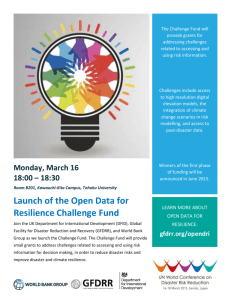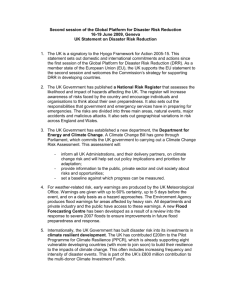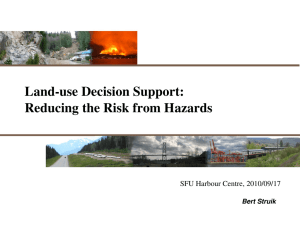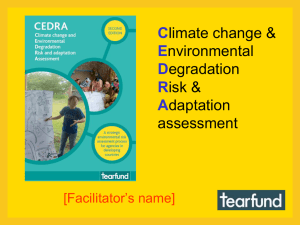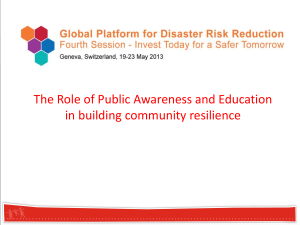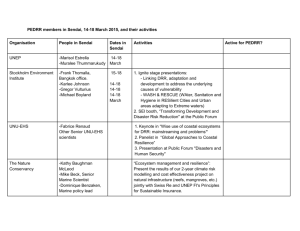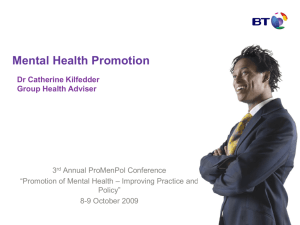A New Manifesto for Networking in
advertisement
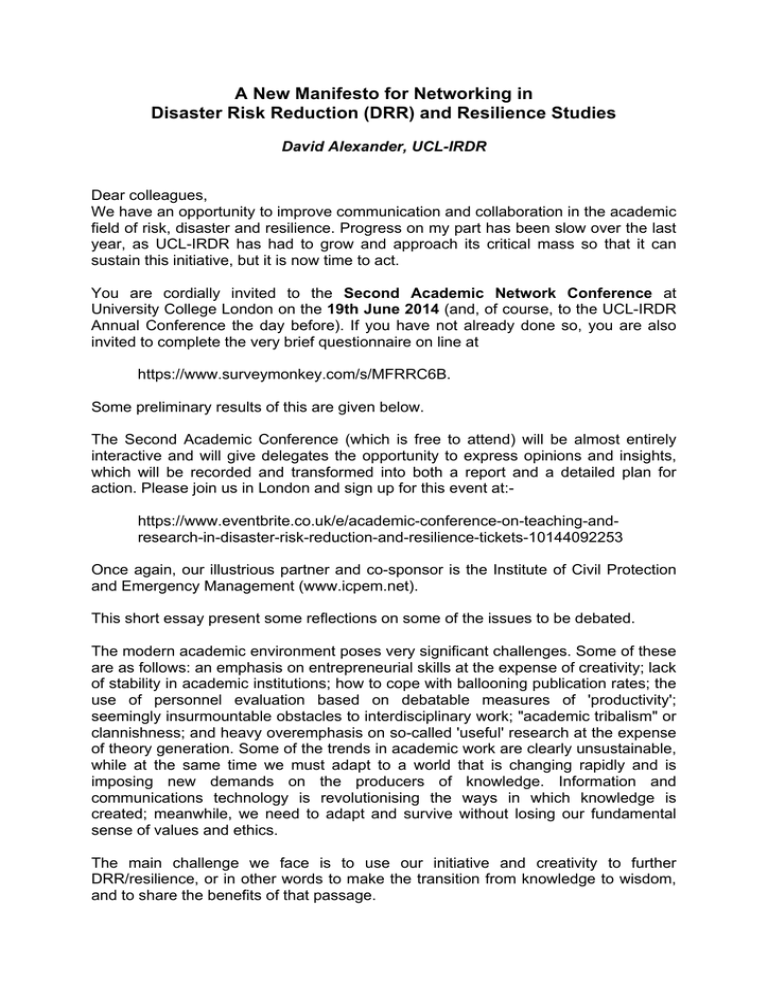
A New Manifesto for Networking in Disaster Risk Reduction (DRR) and Resilience Studies David Alexander, UCL-IRDR Dear colleagues, We have an opportunity to improve communication and collaboration in the academic field of risk, disaster and resilience. Progress on my part has been slow over the last year, as UCL-IRDR has had to grow and approach its critical mass so that it can sustain this initiative, but it is now time to act. You are cordially invited to the Second Academic Network Conference at University College London on the 19th June 2014 (and, of course, to the UCL-IRDR Annual Conference the day before). If you have not already done so, you are also invited to complete the very brief questionnaire on line at https://www.surveymonkey.com/s/MFRRC6B. Some preliminary results of this are given below. The Second Academic Conference (which is free to attend) will be almost entirely interactive and will give delegates the opportunity to express opinions and insights, which will be recorded and transformed into both a report and a detailed plan for action. Please join us in London and sign up for this event at:https://www.eventbrite.co.uk/e/academic-conference-on-teaching-andresearch-in-disaster-risk-reduction-and-resilience-tickets-10144092253 Once again, our illustrious partner and co-sponsor is the Institute of Civil Protection and Emergency Management (www.icpem.net). This short essay present some reflections on some of the issues to be debated. The modern academic environment poses very significant challenges. Some of these are as follows: an emphasis on entrepreneurial skills at the expense of creativity; lack of stability in academic institutions; how to cope with ballooning publication rates; the use of personnel evaluation based on debatable measures of 'productivity'; seemingly insurmountable obstacles to interdisciplinary work; "academic tribalism" or clannishness; and heavy overemphasis on so-called 'useful' research at the expense of theory generation. Some of the trends in academic work are clearly unsustainable, while at the same time we must adapt to a world that is changing rapidly and is imposing new demands on the producers of knowledge. Information and communications technology is revolutionising the ways in which knowledge is created; meanwhile, we need to adapt and survive without losing our fundamental sense of values and ethics. The main challenge we face is to use our initiative and creativity to further DRR/resilience, or in other words to make the transition from knowledge to wisdom, and to share the benefits of that passage. One important purpose of a network is to facilitate information exchange. In the present case, this means improving the intensity of connection and collaboration between academics and their colleagues, and between academics and practitioners. Another important function is to improve the visibility of disaster risk reduction/resilience and enable its protagonists to have a common voice. There are four main ingredients to a possible academic network: research, teaching, service (consultancy, advising, etc.) and more general forms of collaboration. In each of these fields, and where they connect, we need to be clear about what the challenges are with respect to DRR/resilience. Discussion at the meeting on 19th June 2014 will form the material of a common working paper for general circulation, with the aim of representing the diversity of viewpoints and opinions present in the academic community (and to a lesser extent the community of those practitioners who make use of academic expertise). We will endeavour to make a SWOT analysis of the field - strengths, weaknesses, opportunities and threats. Disaster risk reduction/resilience is a field that perpetually seems to be 'emerging' (will it ever have 'emerged'?) and remains not-quite-a-profession. It is not universally accepted as a field of study, although it does attract copious numbers of new entrants. Not all of the protagonists are aware of the full body of knowledge in this field, and hence there is a tendency to rediscover existing knowledge and reinvent existing expertise. In this endeavour, the first hurdle is the fact that, paradoxically in the so-called "information age", it is difficult simply to gain a clear, comprehensive and accurate picture of what is going on. Secondly, it can also be difficult to make one's voice heard. Thirdly, a collective effort is required in order to give the DRR/resilience field an adequate societal impact, make it stable, and ensure that it grows in a healthy, rational manner. The fourth challenge is to increase our connectivity without devoting excessive effort to the task, as we are all very busy people. Finally, one of our primary aims is surely to make a positive difference in how society manages risk and disaster. In synthesis, this initiative concerns how we might improve collaboration on matters of research, teaching, and service activities such as advising and consultancy. It relates to both existing and possible future initiatives, and to recent and anticipated changes. It covers collaboration within the UK and Europe, and with overseas partners and is intended to probe existing and possible future means of sharing information. We should probe deeper into the challenges facing academics in the DRR/resilience field, including the difficulties of facing up to and managing complexity, both in our work and in our subject matter. We may also wish to assess collectively the problems of interdisciplinarity and being defined as interdisciplinary, in other words, the challenges of actually working across disciplinary boundaries. Relevant questions include the following: What is our common operating picture? How can we improve our individual and collective voice? How can we increase connectivity in this academic field? How can we collectively contribute to the improvement of DRR/resilience? How to proceed with this is the subject of the short questionnaire that many of you have completed (and any others are welcome to fill in). In practical terms, the interim conclusions of the survey show that two thirds of respondents would like this initiative to start as an informal group, but with the option to be formally incorporated at some point in the future. Approximately equal preference was given to two proposed names for the group: Disaster Resilience Academic Network – DRAN Academic Network for Disaster Reduction and Resilience - ANDRR Three quarters of respondents want the group to include academics and practitioners from European universities and organisations, not merely academics. Although a small proportion of respondents believes that the priorities are equal, the ranked order of importance was determined to be as follows:1. Facilitating communication between academics in Britain and Europe who are working on DRR/resilience issues, and between such people and practitioners, public administrators and stakeholders. 2. By collaboration, developing a more coherent approach that helps advance the DRR/resilience field by virtue of a common voice that will strengthen our advocacy. 3. Engaging in common tasks, such as the definition of teaching standards and the mapping out of a research agenda. 4. Compiling directories of academic institutions and staff in terms of what we do in teaching research and services in the field of DRR/resilience (for prospective students, clients, mass media, etc.). 5. Setting up a website for exchanging information and publicising the activities of members of the group and their institutions. I look forward to debating these issues further with as many of you as possible on 19th June. Thank you for your attention. David Alexander
